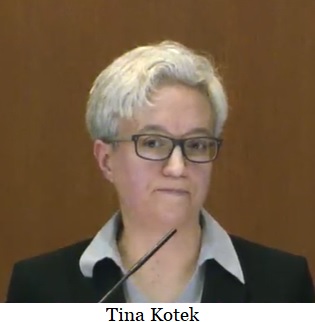“It is clear Governor Kotek’s priority is to protect the status quo”
Oregon's Governor Tina Kotek released her
2025-2027 recommended budget entitled “Building on Progress”.
Governor Kotek says she continues to consult with the Governor’s Racial Justice Council, and these conversations have helped inform her approach to decision making. She states: “My approach to being your Governor will always be grounded in truth, pragmatism, and a relentless pursuit of equitable outcomes for all Oregonians.” Voters could ask how her council, her biggest influence, represents “all” Oregonians.
She touts that her “budget does not lay off people or cut services, and instead strategically deepens her commitment to building progress on Oregonians’ top priorities while remaining disciplined when it comes to new programs.” As Oregonians deal with inflation, growing government isn’t even on Santa’s wish list. “I fundamentally believe the Legislature needs to pass budgets for the next two years that build on the progress we have achieved together.” The majority of Oregonians are scratching their heads to list what she has accomplished.
Governor Kotek made housing and homelessness a top priority in 2023-24, and continues down that path dedicating $700 million for homelessness after the 2023 legislature recriminalized drug laws. It took a 210 percent increase in fentanyl-related deaths for the legislature to correct a failed policy that increased homelessness. Kotek is also asking for $1.4 billion for housing supply after the prior attempt failed in accountability. (
See companion article on homelessness and housing funding.)
Funding for Behavioral Health includes aligning treatment capacity with workforce capacity to close gaps in services. Since day one, Governor Kotek has been working to make her vision for Oregon’s behavioral health system possible: access to care no matter where you live or what you can afford. The 2025-2027 Governor’s Recommended Budget focuses on building treatment capacity and supporting a strong behavioral health workforce by committing more than $330 million, including:
- $90 million in General Fund backfill of ARPA investments for capacity building. The Governor’s budget includes a $90 million investment towards capacity building for adult mental health services, substance use disorder residential treatment, and withdrawal management.
- $50 million General Fund backfill from ARPA to strengthen workforce investments. Governor Kotek is focused on increasing the supply and distribution of a diverse and culturally responsive behavioral health workforce by investing $25.7 million in behavioral health education and training programs, wrap-around supports for students, and tuition assistance and scholarships, and investing $24.3 million in graduate stipends, loan repayment, and peer and manager support for the community mental health workforce.
- $40 million to continue deflection services through the Criminal Justice Commission. The funding supports deflection coordinators, peers and counselors who give individuals struggling with addiction the opportunity to avoid legal consequences and to seek treatment instead.
Governor Kotek’s vision for her Children and Youth funding is to invest for a stronger, healthier future. Building on her education initiative work, she is advancing a multipronged approach to supporting Oregon’s children and youth for a better future in Oregon by committing more than $835 million, including:
- $600 million increase to strengthen the State School Fund Current Service Level (CSL) for a total of $11.36 billion. The Governor is recommending a three-pronged approach to adjusting funding for the State School Fund to move the needle on student outcomes and provide more accurate and predictable funding for K-12 public education across Oregon, along with adjusting the calculation to account for the recent PERS rate increase.
- $205.5 million to provide additional targeted funding to help more students get on track for success. By recommending $127 million to maintain and strengthen previous early literacy investments and $78.5 million to expand and make ongoing investments in summer learning programs, Oregon’s students will get more help to overcome pandemic learning loss.
- $25 million for youth behavioral health investments. Governor Kotek is recommending new investments in targeted residential and community-based behavioral health and substance use disorder capacity, expansion of mental health services, prevention services for school-based health centers, and funding to expand youth suicide prevention work.
"The Department of Transportation is asking for an additional $1.7 billion per year. The Governor’s budget leaves a massive hole that will likely be filled with new taxes. It’s time for the legislature to live within its means and prioritize essential services—just as every Oregonian is forced to do in this struggling economy.”

“Oregonians are sending a clear message that they want a state where everyone has the freedom and opportunity to succeed. House Democrats will protect what makes Oregon special and show that this state is for everyone. We take this responsibility seriously,” said Majority Leader Ben Bowman (D-Tigard, Metzger, S. Beaverton). “In the 2025 session, we will improve the lives of all Oregonians with a focus on affordability, making government work, and keeping Oregonians safe. It’s time to get to work delivering results for working people and protecting Oregonians’ basic rights and freedoms.”
A D V E R T I S E M E N T

A D V E R T I S E M E N T

In response to Governor Tina Kotek’s 2025 budget proposal, House Republican Leader Christine Drazan (R-Canby) stated: "Budgets express priorities and it is clear Governor Kotek's priority is to protect the status quo. This budget has no new ideas and no new vision. What was put forward today is more of the same from Governor Kotek. The Governor proposed a budget that is unsustainable without implementing substantial new taxes, that Oregonians cannot afford and do not support.
“Whether it’s schools, addiction, roads or public safety, under Governor Kotek’s leadership, this budget means Oregonians can expect to pay more, but get less,” Drazen concludes.
--Donna Bleiler| Post Date: 2024-12-03 12:03:17 | Last Update: 2024-12-03 19:12:24 |







 “Oregonians are sending a clear message that they want a state where everyone has the freedom and opportunity to succeed. House Democrats will protect what makes Oregon special and show that this state is for everyone. We take this responsibility seriously,” said Majority Leader Ben Bowman (D-Tigard, Metzger, S. Beaverton). “In the 2025 session, we will improve the lives of all Oregonians with a focus on affordability, making government work, and keeping Oregonians safe. It’s time to get to work delivering results for working people and protecting Oregonians’ basic rights and freedoms.”
“Oregonians are sending a clear message that they want a state where everyone has the freedom and opportunity to succeed. House Democrats will protect what makes Oregon special and show that this state is for everyone. We take this responsibility seriously,” said Majority Leader Ben Bowman (D-Tigard, Metzger, S. Beaverton). “In the 2025 session, we will improve the lives of all Oregonians with a focus on affordability, making government work, and keeping Oregonians safe. It’s time to get to work delivering results for working people and protecting Oregonians’ basic rights and freedoms.”

 In response to Governor Tina Kotek’s 2025 budget proposal, House Republican Leader Christine Drazan (R-Canby) stated: "Budgets express priorities and it is clear Governor Kotek's priority is to protect the status quo. This budget has no new ideas and no new vision. What was put forward today is more of the same from Governor Kotek. The Governor proposed a budget that is unsustainable without implementing substantial new taxes, that Oregonians cannot afford and do not support.
In response to Governor Tina Kotek’s 2025 budget proposal, House Republican Leader Christine Drazan (R-Canby) stated: "Budgets express priorities and it is clear Governor Kotek's priority is to protect the status quo. This budget has no new ideas and no new vision. What was put forward today is more of the same from Governor Kotek. The Governor proposed a budget that is unsustainable without implementing substantial new taxes, that Oregonians cannot afford and do not support.